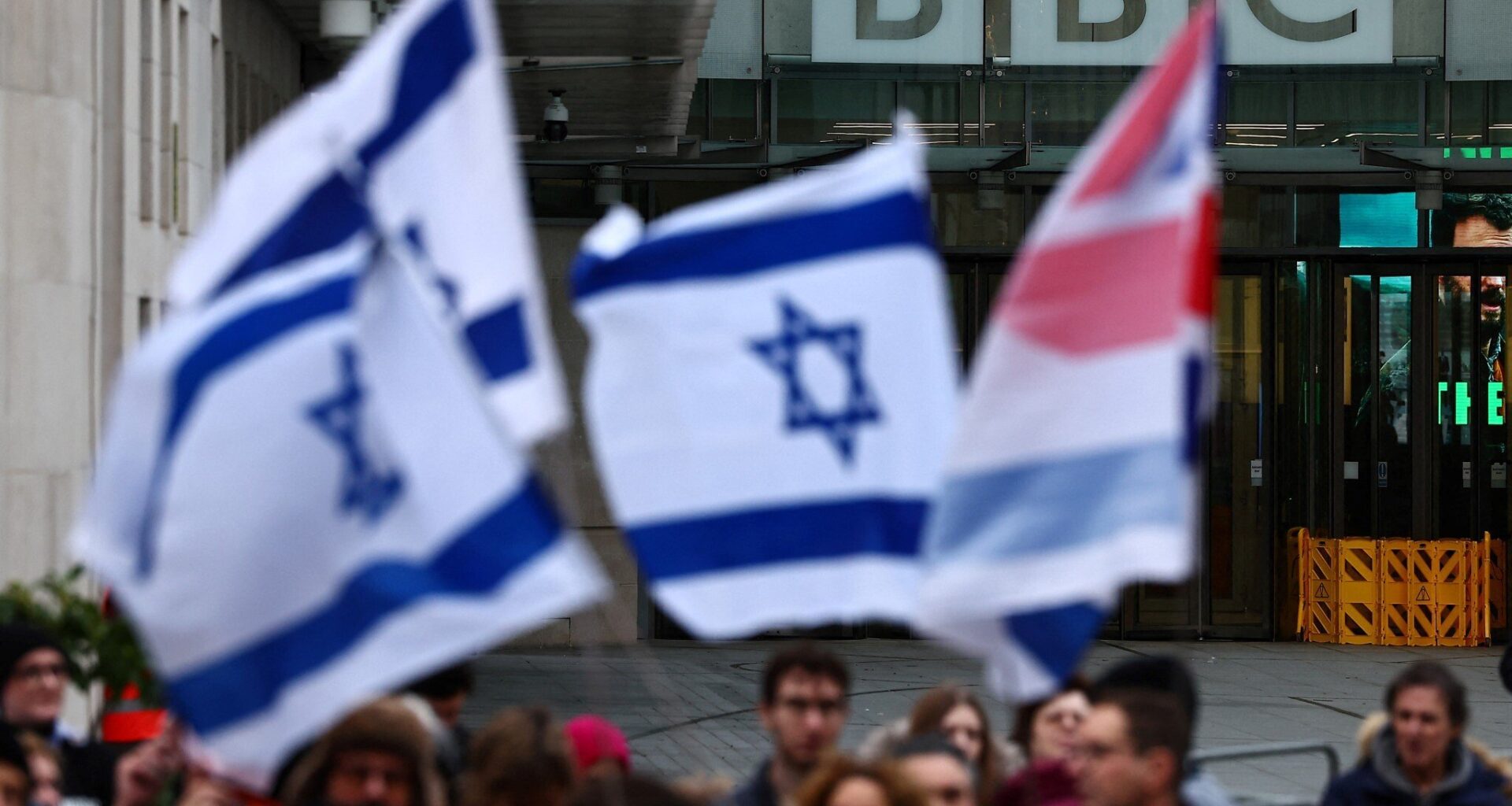In the end, it was revelations concerning the manner in which the BBC’s flagship current affairs program, Panorama, spliced together clips of a speech by US President Donald Trump on January 6, 2021, that forced the corporation’s boss and head of news to quit on Sunday.
But director-general Tim Davie and Deborah Turness, the chief executive of BBC News, have been in the firing line for months over allegations of bias — not least because of the national broadcaster’s coverage of antisemitism, the war in Gaza, and Israel more generally.
And, as the Board of Deputies of British Jews, an umbrella communal group, noted Sunday, the Jewish community’s concerns about the BBC’s coverage of the Middle East stretch back long before the October 7, 2023, Hamas attacks on southern Israel that saw some 1,200 murdered and 251 kidnapped to Gaza, and the ensuing war in the Strip.
Last year, a report that was compiled by researchers led by British-Israeli lawyer Trevor Asserson included AI in analyzing the first four months of the broadcaster’s coverage of the war in Gaza. It suggested that the BBC breached its own editorial guidelines more than 1,500 times during that critical phase of the conflict.
The report also found that, in the corporation’s coverage of the conflict, Israel was associated with genocide more than 14 times more than Hamas.
Get The Times of Israel’s Daily Edition
by email and never miss our top stories
By signing up, you agree to the terms
The following is a glimpse into the major incidents that have led to recent accusations of anti-Israel bias at the BBC – an institution funded by all Britons through the compulsory “license fee” – and the response from the Jewish community.
Terrorists? What terrorists?
The BBC’s coverage of the Gaza conflict sparked immediate controversy when it doggedly refused to label Hamas fighters “terrorists,” instead adopting the more neutral term “militants.”
While the decision caused anger among politicians, Jewish groups, and leading lawyers, senior BBC journalists defended the corporation’s stance by pointing to its founding ethos and requirement to “stay objective,” claiming that terrorism is a “loaded word which people use about an outfit they disapprove of morally.”

Illustrative: Bodies of the victims of the mass murderous attack by Hamas on southern Israeli communities on October 7, 2023, await advanced examination for identification at the National Center of Forensic Medicine (Abu Kabir) in Jaffa, October 16, 2023. (Tomer Neuberg/ Flash90/File)
But the BBC’s claims were undermined by plentiful evidence that it had used the term “terror” attacks to describe, for instance, 9/11, the 2005 London bombings, and the 2015 Bataclan Theatre attack in Paris.
The BBC later said it would shift to describing Hamas as a group “proscribed as a terrorist organization by the UK government and others.”
In reality, it has largely simply used the term “Hamas,” although, in June 2025, the BBC’s internal complaints department upheld a viewer’s complaint against a presenter who referred to Hamas as “the terror group.”
A news alert that roiled the Middle East
Another flashpoint in the early weeks of the war came when the BBC sent out a news alert after the Al-Ahli Hospital blast.
“Hundreds feared dead or injured in Israeli airstrike on hospital in Gaza, Palestinian officials say,” read the alert, which failed to make clear that “Palestinian officials” meant Hamas. The BBC tweet was swiftly and widely shared by, among others, England’s leading clergyman at the time, the former Archbishop of Canterbury, Justin Welby.
BBC news coverage compounded the error, with reporters speculating that, as one put it, “it is hard to see what else this could be… given the size of the explosion, other than an Israeli airstrike or several airstrikes.”
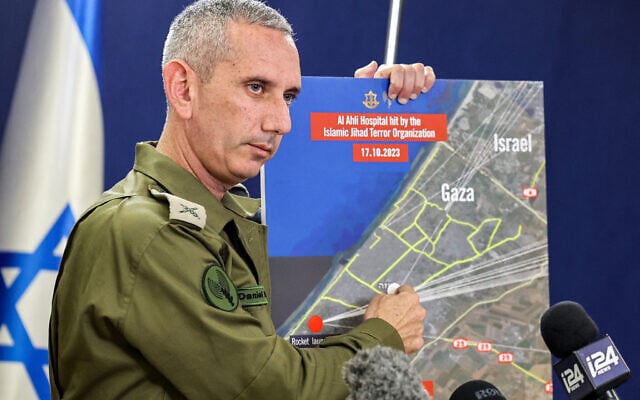
Israeli army spokesman Rear Admiral Daniel Hagari shows the press a graphic of alleged rocket launches near al-Ahli Hospital in Gaza at a press conference in Tel Aviv on October 18, 2023. (GIL COHEN-MAGEN / AFP)
While the BBC later apologized for elements of its coverage of the incident – the hospital blast was caused by a failed rocket launch from within Gaza by Palestinian Islamic Jihad – and the broadcaster was not alone in speculating that Israel was responsible, cities throughout the Middle East and Europe exploded in anger, with attacks on synagogues in Berlin and Tunisia, and then-US president Joe Biden’s meeting with Arab leaders in Jordan canceled.
How to survive the fallout from a Gaza documentary
The BBC’s decision in February to broadcast a documentary, “Gaza: How to Survive a Warzone,” which claimed to follow the lives of four young people affected by the conflict in Gaza, proved one of its most controversial and high-profile errors. The corporation was forced to remove the documentary from its catch-up service, BBC iPlayer, soon after it was revealed that the 13-year-old narrator was the son of Hamas’s deputy minister of agriculture.
The BBC apologized for “serious flaws” in the making of the documentary, which was made by an independent production company.

This screenshot from the trailer for ‘Gaza: How to Survive a War Zone’ shows narrator Abdullah Al-Yazouri, whose father is a Hamas deputy minister. (YouTube screenshot used in accordance with article 27a of the Copyright Law)
In the wake of the ensuing scandal, polling commissioned by the Campaign Against Antisemitism found 57 percent of Britons wanted an independent probe into the BBC’s handling of the documentary, with a similar figure suggesting they did not trust the broadcaster to investigate the issue. In October, the media regulator, OfCom, ruled that the BBC committed a “serious breach” of broadcasting rules for failing to disclose that the narrator of a documentary about Gaza was the son of a Hamas official. Ofcom ordered the BBC to broadcast a prime-time statement of its ruling – the first occasion on which the regulator has told it to make an on-air apology since 2009.
Referring to the fallout from the documentary, the chair of the BBC, Samir Shah, told parliamentarians during a hearing in March: “This is a really, really bad moment. What has been revealed is a dagger to the heart of the BBC’s claim to be impartial and to be trustworthy.”
Gary Lineker departs …
Gary Lineker, for many years the BBC’s highest-paid TV presenter, had run into trouble with the corporation’s bosses on a number of occasions. In March 2023, the former England football (soccer) star, who presented the BBC’s Match of the Day program, was temporarily suspended for breaching BBC impartiality guidelines after criticizing the former conservative government’s asylum policy and comparing the language used by ministers to “that used by Germany in the 1930s.”
That didn’t appear to stop Lineker from wading into controversies surrounding the conflict in Gaza on a number of occasions, including retweeting calls to have Israel banned from international sporting bodies (which he later deleted), and appearing to endorse an Israeli academic’s claim that the war was a “textbook genocide.”

Britain’s Prime Minister Keir Starmer, right, laughs with Gary Lineker during a reception to celebrate St. George’s Day at 10 Downing Street, in London, April 22, 2025. (Stefan Rousseau/Pool Photo via AP)
In response to criticism, Lineker said last December, “I’m anti-Israel government. I’m not in the slightest bit antisemitic. I’m not anti-anybody. I am anti-bad people.”
In February, Lineker signed an open letter defending the controversial “Gaza: How to Survive a Warzone” documentary and calling for the BBC to reinstate it on BBC iPlayer. He later said he found the documentary “incredibly moving” and said the BBC had “just capitulated to lobbying that they get a lot.”
In May 2025, Lineker’s social media activity finally caught up with him. The sports presenter announced he was leaving the BBC earlier than planned and would not, as previously announced, lead its coverage of next year’s World Cup, after sharing an anti-Zionist Instagram post that featured an image of a cartoon rat.
Lineker “apologized unreservedly” for sharing the post, saying he would “never knowingly share anything antisemitic.” Four months later, he won the National Television Award for best presenter.
… and Bob Vylan takes center stage
Barely a month after Lineker’s departure, the BBC was plunged into a new row over antisemitism when the corporation failed to pull the plug on a live broadcast of a set at the Glastonbury music festival in which the rap-punk duo Bob Vylan chanted, “Death, death, to the IDF.” The broadcast was criticized by Prime Minister Keir Starmer, Culture Secretary Lisa Nandy, and opposition leaders. Chief Rabbi Ephraim Mirvis called the moment “a time of national shame.”
“The airing of vile Jew-hatred at Glastonbury and the BBC’s belated and mishandled response brings confidence in our national broadcaster’s ability to treat antisemitism seriously to a new low,” stated Mirvis.

Bobby Vylan, of British duo Bob Vylan, crowdsurfing while performing on the West Holts Stage on the fourth day of the Glastonbury festival at Worthy Farm in Somerset, England, on June 28, 2025. (Oli Scarff/AFP)
Davie was at Glastonbury at the time of the incident, was informed about it, and ordered staff to ensure Vylan’s performance did not feature in any ensuing coverage. The Community Security Trust, which protects Jewish venues and monitors Jew-hate, later revealed that reports of antisemitic incidents in the UK spiked the day after the broadcast, reaching their highest daily total during the first six months of 2025.
After initially conceding only that Bob Vylan’s comments were “deeply offensive,” the BBC later admitted that the livestream should have been pulled.
“The antisemitic sentiments expressed by Bob Vylan were utterly unacceptable and have no place on our airwaves,” the corporation stated.
‘Pushing Hamas lies around the world’
The BBC’s Arabic service – which is funded in part by a grant from the Foreign, Commonwealth and Development Office, as well as the license fee – has long proved a source of contention and criticism. However, a leaked memo, published by the Daily Telegraph last week, which was written by Michael Prescott, an independent adviser to the BBC’s Editorial Guidelines and Standards Committee until June, laid bare BBC Arabic’s multiple failings.
According to the Daily Telegraph, Prescott — who wrote the memo because he was angered by the corporation’s failure to act over multiple instances of bias in BBC reporting — alleges BBC Arabic chose to “minimize Israeli suffering” in the war in Gaza so it could “paint Israel as the aggressor”; “raced to air” allegations against Israel without performing adequate checks, reflecting “a desire always to believe the worst about Israel”; and allowed journalists on air who had made extreme antisemitic comments.

BBC Arabic journalist Samer Elzaenen who has made a slew of antisemitic posts online. (Facebook)
A contributor who said Jews should be burned “as Hitler did” appeared on BBC Arabic 244 times in 18 months, while another who labeled Jews as “devils” featured 522 times in the same period. Prescott also outlined substantive differences between reporting on the main BBC website and BBC Arabic’s output. The latter, for instance, avoided publishing stories on its website about the Israeli hostages or those critical of Hamas.
Prescott also highlighted how internal BBC reviews concluded it had given “unjustifiable weight” to Hamas’s much-disputed figures for the death toll in Gaza, as well as reporting unsubstantiated allegations of war crimes committed by Israeli forces.
In an article for the Daily Telegraph, Danny Cohen, the former director of BBC Television, responded to the newspaper’s revelation by arguing, “That the BBC has helped to push Hamas lies around the world and fuelled antisemitism at home cannot now be in doubt.”
‘Jews don’t count’
Unease and anger among many British Jews at the BBC have grown throughout the war in Gaza. A survey of over 4,000 people conducted by the Campaign Against Antisemitism in June 2024 found that 92% of Jews rated the BBC’s coverage of matters of Jewish interest as unfavorable. Two months later, more than 200 British Jewish figures from the TV and film industry signed a letter to the BBC alleging “systemic problems of antisemitism and bias” at the broadcaster.
“We are members of the wider British Jewish community and can vouch with certainty that there is a loss of faith in the BBC within our community and a widespread opinion that, when it comes to racism and discrimination at the BBC, ‘Jews don’t count,’” the letter argued. “By contrast, we are certain that were similar incidents to occur at the expense of any other minority, the BBC would show zero tolerance.”
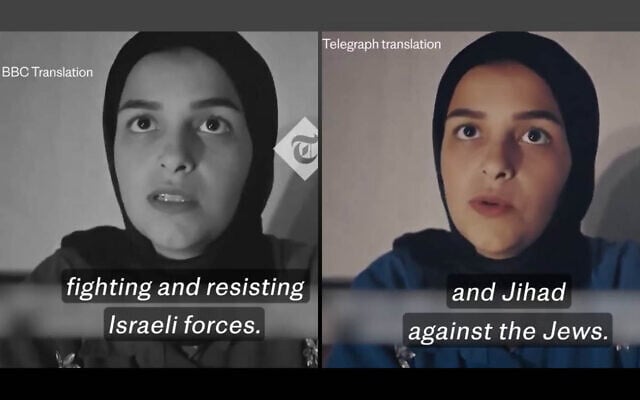
A screenshot showing the mistranslation of the BBC’s subtitles in the documentary ‘Gaza: How to Survive a War Zone.’ (Screenshot from X, used in accordance with Clause 27a of the Copyright Law)
The corporation’s response to the letter, which was signed anonymously by more than 100 current BBC staff, failed to assuage concerns in the community.
In September 2024, the Board of Deputies of British Jews, the Jewish Leadership Council, and the Community Security Trust signed a joint letter to The Times in which they said BBC coverage had “led many British Jews to conclude that the BBC has become… institutionally hostile to Israel.” In their letter, the three communal groups endorsed a report by the Committee for Accuracy in Middle East Reporting and Analysis, which alleged, “Whenever the corporation is faced with the choice of whose account or narrative to believe, it seldom points in Israel’s direction. For Hamas in this war, proof is rarely necessary. For the IDF and Israel, proof is rarely enough.”
‘No systematic bias’?
The controversy surrounding allegations of anti-Israel bias at the BBC is not new. Twenty years ago, in October 2004, for instance, BBC journalist Barbara Plett reported on Yasser Arafat’s final departure from his West Bank compound for Radio 4’s “From Our Own Correspondent.”
“When the helicopter carrying the frail old man rose from his ruined compound, I started to cry,” she told listeners. The broadcast provoked hundreds of complaints from listeners, with the BBC later admitting that her comments “breached the requirements of due impartiality.”
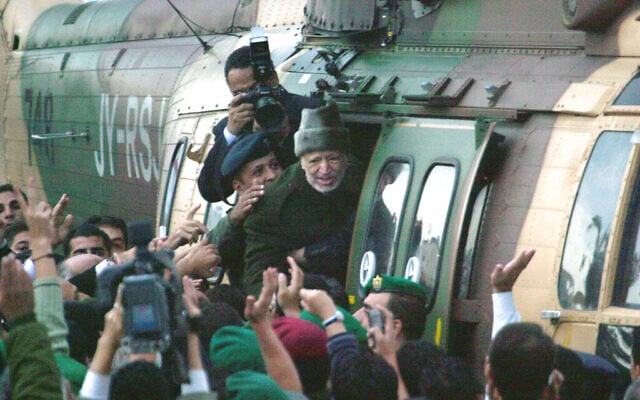
Palestinian leader Yasser Arafat boards a Jordanian Air Force helicopter as he prepares to leave his headquarters in the West Bank town of Ramallah, October 29, 2004. (AP Photo/Enric Marti)
The row over Plett’s report came in the same year as the BBC commissioned an internal probe by senior journalist Malcolm Balen to examine the BBC’s Middle East coverage for signs of bias. But the 20,000-word Balen investigation did nothing to settle the matter – because the BBC never published the report and, indeed, fought a long legal battle to prevent its release under the UK’s freedom of information laws.
Ironically, the report is believed to have cleared the broadcaster of systematic bias, while suggesting that a number of factors – including inconsistent use of language – fuelled the perception of bias. A later independent external review of reporting commissioned by BBC bosses and published in 2006 found “no deliberate or systematic bias” in the broadcaster’s reporting of the Middle East but said its approach had at times been “inconsistent” and was “not always providing a complete picture,” which had been “misleading.”
Blaming the victim
Perhaps one of the most egregious examples of the BBC’s treatment of the Jewish community came in the form of a report by the broadcaster in November 2021 centered on an antisemitic attack on Jewish students. The incident occurred as the teenagers traveled in a privately hired bus through central London, where they had been celebrating Hanukkah. Video images showed men spitting at the bus and apparently abusing passengers, and a man seeming to make a Nazi salute.
But the BBC also reported anti-Muslim slurs had been heard on an audio recording from inside the bus (which it later changed to the singular “slur”). That claim was disputed by Jewish groups, and the BBC was provided with evidence that the allegedly offending phrase could have been: “Call someone, it’s urgent” in Hebrew.

A man (R) appears to make a Nazi salute, in a video showing a group of people accosting Jews on a Chabad bus as they celebrated Hanukkah in London, November 28, 2021. (Screen capture: X)
“The BBC thought that they heard a slur in English. What they were actually hearing was a distressed Jewish man speaking in Hebrew, appealing for help,” the Board of Deputies of British Jews said. The BBC was eventually forced to apologize, and the broadcasting regulator, Ofcom, later ruled it had committed “significant editorial failings” and “failed to promptly acknowledge that the audio was disputed and did not update its online news article to reflect this for almost eight weeks.”
As one parent of the abused Jewish teenagers later told the Jewish Chronicle: “BBC News has demonized my son, who was on that bus, to serve their anti-Jewish agenda.”
It’s not all about Israel
As Prescott’s leaked memo outlines, concerns about bias at the BBC aren’t confined to how the broadcaster reports on Israel. The corporation’s coverage of trans issues is reportedly subject to “effective censorship” by specialist LGBT reporters who refuse to cover gender-critical stories and “[keep] other perspectives off air.” It has also been accused of anti-Brexit reporting.
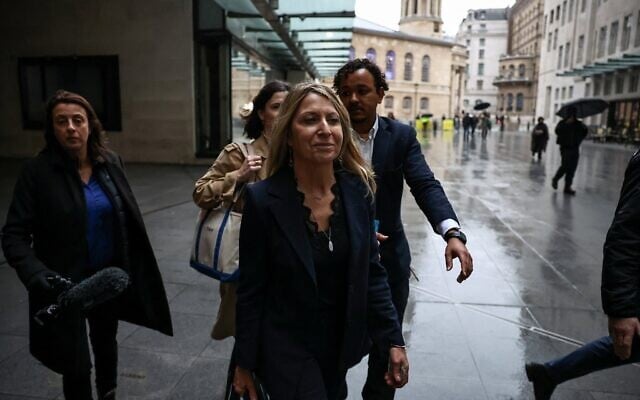
Deborah Turness (C), who resigned the day before as BBC News CEO, arrives at the offices of the BBC in London on November 10, 2025. (HENRY NICHOLLS / AFP)
Nor is criticism of the BBC confined to the political right, with accusations that it is “obsessed” with covering the same stories as pro-Conservative newspapers such as the Daily Mail.
“The BBC’s routinely so anxious about being accused of being left-wing, it quite often veers in what you might call … [a] rather right-wing direction,” its former economics editor, Robert Peston, suggested in 2014. And the BBC has frequently found itself at loggerheads with both Labour and Conservative governments in Britain when the UK’s forces are engaged in military action. Its coverage of the 1982 Falklands War enraged former prime minister Margaret Thatcher, while allegations the broadcaster’s journalists leveled at Tony Blair’s government following the 2003 invasion of Iraq eventually led both the BBC chair and director-general to quit.

